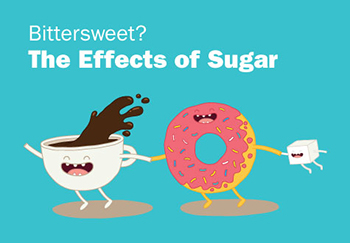
You know that eating too much sugar is not a good idea. Being a smart consumer, you make sure to keep the extra calories, inflammation and cravings (and all the health problems they bring) away by reading labels and watching your sugar intake. And, because you sometimes want to enjoy a sweet treat, you look to sugar substitutes to get that sweet fix. But are sugar substitutes toxic for your gut? Some recent research suggests that they are.
The Skinny on Sugar Substitutes
Researchers found that sugar substitutes may negatively affect your gut microbiome. Your gut microbiome is the collection of bacteria and other microscopic organisms that live in your intestines. They are a natural part of your gut environment. They help your gut to work properly, which is a critical element of your overall health.
So, how are artificial sweeteners bad for your gut microbiome? We spoke with Amy E. Doran, MD, a healthcare provider on UVA Health’s digestive health team, to learn more.
Sugar Substitutes: What are They?
Sugar substitutes are just that – chemicals or extracts that aren’t sugar, but are safe to use in food to make them sweeter without adding lots of extra calories. Sometimes called artificial sweeteners, you’ll find them in foods labeled as “diet” or “low-calorie.” They live on grocery store shelves and at the restaurant, in colorful packets next to the regular sugar.
Although they go by different names on the packet, the most commonly found sugar substitutes in the U.S. are:
- Aspartame (blue packet)
- Saccharin (pink packet)
- Stevia (green packet)
- Sucralose (yellow packet)
- Luo han guo (monk) fruit extract (orange packet)
Other FDA-approved and commonly used sweeteners include acesulfame potassium, neotame, advantame and sugar alcohols (such as xylitol, mannitol, sorbitol and others).
All of these sweeteners differ in how intense of a sweet flavor they can give, how many calories they add to food and what their aftertaste is like. Often, more than one sugar substitute is in a food or product to give it the exact taste and feel that the manufacturer wants. And, they show up in products we may not realize, like toothpaste, chewing gum and powdered nutrition supplements. “Artificial sweeteners are actually very challenging to study in humans, because they’re everywhere. It’s in so many products that people don’t even realize,” says Doran.
How Artificial Sweeteners and Gut Bacteria Affect Health
“There are a lot of things that the microbiome itself has been implicated in,” states Doran. Studies have shown that the gut microbiome can affect your mood, immunity, appetite and energy level. “Looking at the data, we believe there is an association between microbiome health and developing metabolic syndrome or diabetes which, in turn, can lead to heart disease, hypertension and elevated cholesterol.”
Also, what’s in our microbiome changes depending on the foods or medicines we use, as well as other habits. “Pretty much everything in your environment can alter and contribute to the microbiome,” continues Doran. “You are what you eat, so to speak, and those around you are the same. Interestingly, people who live in the same household have very similar gut microbiome profiles. Even in the last couple of years, we’ve gotten a much better understanding of what the bacterial profile living in the gut is like.”
Toxic Headlines
The study, which was done in mice by researchers in Israel and Singapore, used modified E. coli bacteria (one kind of bacteria that is common in our gut) to detect toxicity. When the bacteria were exposed to six common artificial sweeteners (aspartame, sucralose, saccharine, neotame, advantame and acesulfame potassium-k), the bacteria released toxins, even when exposed to low amounts.
When the study first appeared, many news outlets rushed to report that artificial sweeteners were “toxic to gut health.” But is that the whole picture?
Should I Put the Packet Down?
Doran explains that the results on artificial sweeteners aren’t so clear-cut.
“There have been multiple studies looking at artificial sweeteners and the microbiome,” says Doran. “For instance, a 2015 study looked at rats that were fed high-fat diets compared to those who were fed a high-fat, high-aspartame diet. And they found a change in both of their microbiomes. But, in the mice with aspartame, the result was more dramatic. So, it does appear that aspartame can impact the microbiome. So, we know that what you eat changes your microbiome.”
Doran also points out that the way the study was conducted doesn’t really reflect exactly how sugar substitutes affect the whole gut microbiome. “I think the benefit of this study is that it’s looking at so many different sweeteners and found that they had this ‘toxic’ effect on the bacteria. That being said, the only bacteria that they were studying here was E. coli, which we know lives in the microbiome and is part of the normal gut flora. But it’s not part of the ‘Big Four’ of bacteria that we consider the main key players of the microbiome (which are Firmicutes, Bacteroidetes, Actinobacteria and Proteobacteria),” states Doran.
And, other studies have disagreed that sugar substitutes actually negatively affect your health. A recent review of studies concluded that while sugar substitutes do affect the gut microbiome, “no evidence of an actual adverse effect on human health” has been proven.
Worried About Gut Health?
Contact a primary care provider to have your gut health checked.
Moderation is Best
Doran says to stick to the tried-and-true recommendations for keeping your digestive system healthy. “We know the microbiome interacts with the human host. It’s important to try to eat a diet that’s very high in vegetables and fiber. That helps to promote a better microbiome. Eating a high-fiber, plant-based diet is the way to go. If you ‘re someone who has a real sweet tooth, should you eat something very high in sugar, or eat something with artificial sweeteners in it? Honestly, I think trying to limit both is best,” states Doran.


What is the safest artificial sweetener t use in coffe or tea?
Hey Flo: We addressed your question to Katherine Basbaum, MS, RD, a clinical dietitian with UVA Health. She says, “We cannot, with the research available at this time, single out one of the artificial sweeteners as being ‘safest’ for maintaining a healthy gut. With that said, the sweeteners Splenda and Stevia extract are more natural than the others and seem to have a potentially smaller effect on the gut microbiota. This is not to say that one could consume extremely large amounts per day (upwards of 20-30 packets per day) without potential harm so, whichever you chose, use sparingly. But If it’s just in a couple cups of coffee per day either type appears perfectly safe.” As with all health-related questions, it’s best to consult with your primary care provider. Thanks!
I do a quarterly wellness newsletter for the UVA Health Benefits Consortium a group made up of 18 UVA Foundations. I would like permission to reprint the three articles regarding sugar and cookies, and diet soda. Would you give permission? I may be reached at
Judi Kay,MA, CWP
UVA Health Benefits Consortium
wellnesscoordinator@uvafoundation.com
434-243-8023
Thank you,
Judi